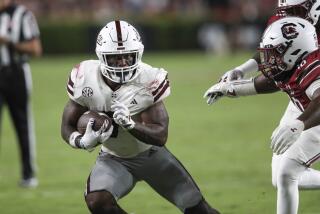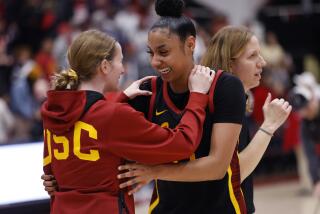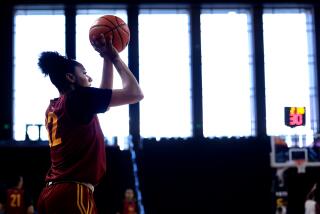At UCLA, Wicks was a man of his time, and for all time
- Share via
Sidney Wicks cannot imagine a more rewarding college experience than the one that ushered him into adulthood in the late 1960s and early ‘70s.
It was an era of tumultuous social change in the United States, and much of it took root on college campuses.
“It was probably one of the most critical times in our country’s history,” the former UCLA basketball star says from his home outside Wilmington, N.C. “There was student unrest, black awareness, a cultural and sexual revolution.”
And in Westwood, of course, there was UCLA basketball, a dynasty under John Wooden that thrived amid the chaos.
“We had to deal with all these things going on outside our house while still taking care of business as student-athletes,” Wicks says. “It was a great time to be in L.A. and to be a Bruin.
“We were very successful.”
Wicks, arguably the greatest power forward in UCLA history, helped the Bruins win three consecutive NCAA titles, Nos. 3, 4 and 5 in their record-breaking run of seven in a row.
A sidekick to Lew Alcindor as a sophomore in the 1968-69 season, the 6-foot-8 Wicks jumped to the forefront as the Bruins’ leading scorer and rebounder in his junior and senior seasons, bridging the gap between Alcindor and Bill Walton and earning national player-of-the-year honors in 1971. In his three seasons, UCLA was 86-4.
“It was the best of times,” says Wicks, who will be honored along with other members of the Bruins’ 1969 championship team Saturday at Pauley Pavilion. “My experience there as a player, as a student, as a person . . . was unbelievable -- topped by being around the greatest coach in the history of athletics.”
Not surprisingly, Wicks was never able to replicate the experience during 10 seasons in the NBA.
The No. 2 pick in the 1971 draft, he was rookie of the year in his first season with the fledgling Portland Trail Blazers and made the All-Star game in each of his first four. But after averaging 24.5 points and 11.5 rebounds as a rookie, Wicks saw his scoring average decline in each of his next nine seasons, the last five with the Boston Celtics and then-San Diego Clippers.
When he retired in 1981, he had appeared in only nine playoff games -- only one of his teams made the playoffs and just two even had winning records -- and was generally regarded as having fallen short of living up to his enormous potential. As the late Stu Inman, a former Trail Blazers executive, later told the Portland Tribune, “I would have drawn the conclusion he would have had a much better career.”
Wicks calls the criticism unfair, “but that’s not for me to say,” he notes. He averaged 16.8 points and 8.7 rebounds.
“I think I did as well as I could,” he says. “In Portland, I think I did extremely well. And then when I went to the Celtics, we did extremely well as a team; we went to the [semifinals] in the Eastern Conference. In San Diego, we were a building franchise that didn’t get its wings and still hasn’t gotten its wings. . . .
“I think my career may have gotten cut short a little bit, but besides that, I have no regrets.”
At UCLA, of course, there was no denying his brilliance. John Vallely, Wicks’ teammate for two seasons in Westwood, calls the dynamic forward “one of the most talented players to ever come through UCLA” and “a tremendous college player.”
Wicks, who will turn 60 in September, later returned to UCLA as a volunteer assistant coach to Walt Hazzard, a four-year stint that ended when Hazzard and his staff were fired in 1988.
After that, Wicks retreated from public life, living for years in Atlanta before settling in North Carolina. Divorced, the Hamilton High graduate makes frequent trips to Los Angeles, where he owns a home and his daughter works in the film industry.
“The only place I wanted to coach was UCLA,” says Wicks, who makes his living as a real estate investor. “I felt really happy there. It was familiar surroundings, making my university hopefully do better . . . and being around these young guys and seeing them grow as people as well as athletes.
“It was really cool . . . and so gratifying to me. But once that was over, I didn’t want to do it anywhere else.
“I just wish we’d done better and been able to stay.”
In North Carolina, Wicks says, “I’m just living my life. I haven’t disappeared or anything like that.”
His passions include sports and travel.
“And I’m very into the arts,” he says. “I’m into people; people are my thing. I was a sociology major, and I’m a people person.”
His only health issue, Wicks says, is a balky back, the aftereffect of a serious traffic accident in which a car he was driving was broadsided by a cement truck about 20 years ago. Suffering a ruptured spleen, broken ribs and other injuries, Wicks was unconscious for a week and hospitalized for three.
“It was touch and go,” he says.
More recently, Wicks says, he suffered a “family tragedy,” politely declining to offer specifics.
“I don’t want to get into it,” he says, “but up until that time, everything was sweet. It couldn’t have been better.”
This Saturday, he hopes to reconnect with old friends.
“I sometimes see guys when I’m out in L.A.,” he says of his former teammates, “but we don’t have a lot of contact.”
--
More to Read
Go beyond the scoreboard
Get the latest on L.A.'s teams in the daily Sports Report newsletter.
You may occasionally receive promotional content from the Los Angeles Times.






